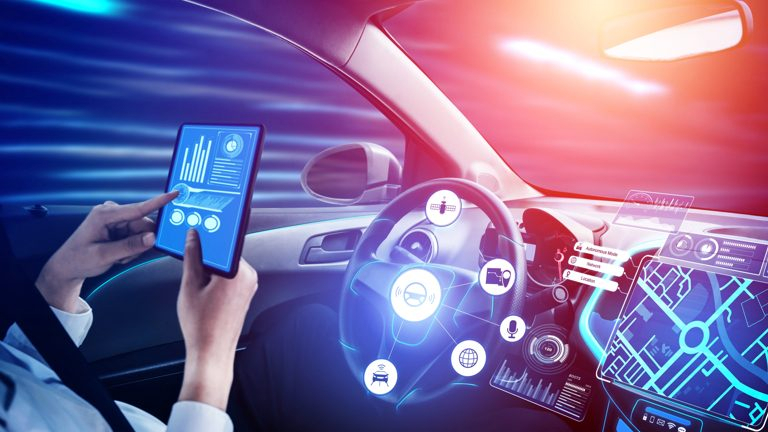When motorized vehicles were first seen in the early 1800s, these ‘horseless carriages’ were perceived with ‘magic and wonder’. They brought with them a paradigm shift in the way people moved and lived.
In 1902, Henry Ford built his own ‘horseless carriage’, but had already failed twice at manufacturing commercial automobiles. It was his partnership with Alexander Y. Malcomson, Detroit’s largest coal dealer, that helped him succeed with his third attempt – . Ford’s Model T.
He revolutionized mass production of these ‘magical vehicles’ that were affordable and targeted at the masses. Using assembly lines, around 10,000 cars were being produced each day; this was a milestone moment in automation for the entire manufacturing sector, changing the very nature of production. Over the years, several car manufacturers entered the fray and automation in the manufacturing sector increased several fold, sparking a revolution in the manufacturing industry.
The next milestone in automobile evolution is here – digitalization is sparking a new revolution for the sector, redefining personal transportation yet again. New horizons are emerging around digitalization, especially through ‘Industry 4.0’ and Industrial Internet of Things (IIoT).
Digitalization is re-defining mobility and the car ownership experience
Digitalization and automation are re-defining mobility and can be seen as a win-win for both, car owners and automobile manufacturers.
While cars were earlier seen as a luxury, they have now become a necessity and an integral part of lifestyle experience. They are much more than just means of personal commute. Apart from the avenues that mobility opened up for them, car owners are now ready for a new relationship with their vehicles, through smart cars and in-built ‘digital assistants’.
For car manufacturers, digitalization is helping them maintain an ongoing and direct relationship with their customers, apart from getting access to data collected by these smart vehicles. This data is helping car manufacturers get insights into the ownership experience, driving behavior and vehicle response in different conditions, which aids their future development and business strategies. Digitalization is also automating the manufacturing processes with new efficiencies and helping them innovate on behalf of consumers with partners in the ecosystem, such as dealers and insurance providers.
Manufacturers are increasingly relying on technology across their processes
Automobile manufacturers are depending on digitalization like never before. Digital technologies are being applied across processes, right from product design to customer engagement. These include:
- Digital technologies are being used for product and process simulations, closing the gap between product design and manufacturing feasibility. With virtual prototypes reducing cost of research and development, it is also leading to faster production and easy management of complexities.
- With Supply Chain 4.0, supply chain management and logistics have become more automated.
- Dealers and service networks are now closer to the automobile manufacturers, thanks to digitalization. Dealerships have become touchpoints for customer experience.
- With customers moving to digital buying experiences, sales and marketing is embracing new technologies to include personalization and improve the car buying experience.
Digital technologies fulfill the promise of personalized mobility
With the advent of ‘smart’ cars that often come inbuilt with digital assistants, the relationship that people have come to have with their vehicles has transformed. Right from research around the kind of vehicle they want to buy, to the purchasing cycle that follows, people are turning to online channels or a combination of online and physical channels. This is the reason that many automobile manufacturers are turning to digital channels – to attract buyers and maintain a sustained relationship with customers.
With increasing digitalization, the driving experience has also seen a transformation. Smart cars are improving the driving experience in a myriad of ways – by informing their owners about the time taken to reach their destination, vital parameters such as air pressure in the tires, roads to avoid, parking assistance, speed warnings – and this is just the beginning.
Dashboards in cars have been reimagined and now are a portal for a host of infotainment and telematics services. In-car digital assistants not just improve conveniences, but also offer a host of services, such as vehicle tracking, security and 24/7 road assistance in case of any breakdown/ accident.
Reshaping public commercial transportation
Digital disruption is also now igniting imagination of new systems around public and commercial transportation. Online ticketing, online payments, tracking and other digital options are now seen as pre-requisites of an efficient public transport system. But to popularize use of public transport, urban planners are looking at the opportunities digitalization has to offer.
Digital solutions for fleet management and route optimization are being used by several public transport operators across the world, while apps integrating different modes of public transport – buses, trams, metro rail, mono rail etc. – are either already in use or are being developed in several cities.
The future of transport with autonomous, electric, connected and personal vehicles
The automobile sector is going through another paradigm shift. With climate change now more real than ever, automobile manufacturers are investing heavily in electric vehicles. Research is ongoing into the sphere of autonomous or self-driven cars, which is likely to herald a completely new era of transportation.
Despite the ground-breaking research and huge investment in these areas, car ownership has seen a decline. Towards this end, shared mobility, such as ride sharing or carpooling, could see a rise in the future.






